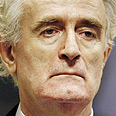
Karadzic: US helped Iran arm Muslims
Ex-Bosnian Serb chief seeking evidence that Washington turned blind eye to weapon shipments from Tehran to Muslim forces fighting in Bosnian war
Radovan Karadzic is seeking evidence that the US turned a blind eye to weapon shipments from Iran to Muslim forces fighting in the Bosnian war, to support his claim that Serbs acted in self-defense during the conflict.
In written responses from jail to questions by The Associated Press released Wednesday, Karadzic said he has asked several countries for documents that will support his contention they violated the UN arms embargo during the 1992-95 conflict.
He said this included direct US military supplies to the Bosnian Muslim army and Iranian weapons sent through Croatia with the support of US Ambassador Peter Galbraith.
"Those Americans well knew that the Bosnian Muslims were attacking civilians when they provided them with weapons. They are, themselves, aiders and abettors ... with responsibility for war crimes," he wrote.
Karadzic's comments to AP indicated that Serb self-defense against his allegation of Muslim aggression will likely be the central theme of his case. His trial is expected to begin within a few weeks at the Yugoslav war crimes tribunal in The Hague.
Karadzic is leading his own defense against charges of genocide and during the 1995 slaughter of Bosnian Muslims in the UN-declared safe zone of Srebrenica and other crimes against humanity during the three-year war, in which an estimated 100,000 people were killed.
In a first for the 16-year-old UN Yugoslav tribunal, judges have allowed Karadzic to communicate with journalists, but only in writing with no opportunity to ask follow-up questions and only after his responses have been reviewed by the tribunal.
Karadzic ignored AP's questions regarding his 13 years as a fugitive, his relations with his top general Ratko Mladic who has eluded capture, or his social contacts at the UN detention center in The Hague, where he is locked up with dozens of former enemies and allies undergoing war crimes trials.
The tribunal also asked Karadzic to revise his answers to the AP, said his legal adviser Peter Robinson.
Karadzic, the Serb's flamboyant and outspoken wartime leader in the splintered state of Bosnia-Herzogovena, was indicted for war crimes in 1995 and disappeared into hiding in 1998. He was captured in Belgrade in July 2008 disguised as a teacher of new-age philosophies.
In his response to AP, Karadzic sharply attacked the US and other NATO countries for violating the UN arms embargo while enforcing sanctions against the Serbs.
He said he wants to present documents at his trial showing the US, Britain, Germany and France "envisaged the breakup of Yugoslavia and a bloody civil war in Bosnia long before I was on the political scene," and that their intelligence services fueled the war.
'Very disappointed'
Karadzic's allegations of US embargo violations are not new.
A year after the war ended, select committees of the US Senate and House of Representatives concluded that the Clinton administration had adopted a "green light" policy for Iranian arms shipments to Bosnia.
The US believed the Muslims were under attack by overwhelming forces of Bosnian Serbs, backed by the rump state of Yugoslavia and its President Slobodan Milosevic.
The committees concluded that in April 1994 Clinton told Galbraith to inform Croatia that he had "no instructions" regarding Croatia's decision to transship weaponry from Iran to besieged Muslim troops. The committees found that the CIA and the Defense and State departments were only informed afterward of the Clinton administration's tacit approval.
Karadzic also said he "was very disappointed" that the tribunal had refused to hold a special hearing on his claim that US peace envoy Richard Holbrooke promised him immunity from prosecution if he left office in 1995. He said he has submitted testimony from 18 witnesses backing up his story. Holbrooke has denied making any such deal.
Karadzic has appealed a ruling that any immunity agreement would be invalid, even if it existed.
"It would be a real setback for international law if this Holbrooke Agreement were swept under the rug or found to be meaningless," Karadzic wrote to AP. "How can wars in the future be ended if leaders cannot trust that the highest international representatives have the authority to deliver on their promises?"










